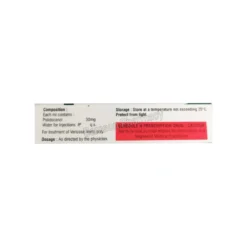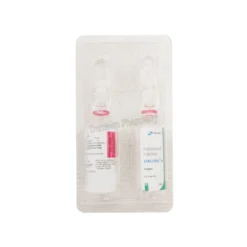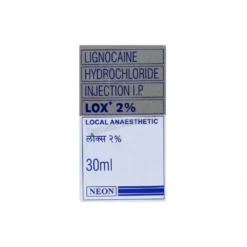Asklerol 3% Injection
$40.00 – $300.00Price range: $40.00 through $300.00
| Pack Size | Price | Price / Unit | Quantity | |
|---|---|---|---|---|
| 2 Injections | $40.00 | $20.00/ unit | ||
| 10 Injections | $180.00 | $18.00/ unit | ||
| 20 Injections | $300.00 | $15.00/ unit |
Looking for bulk / B2B pricing? | Send Inquiry |

| SKU | 11406 |
| Manufacturer | Samarth Life Sciences Pvt Ltd |
| Categories | Surgical |
| Delivery Time | 10 - 14 Working Days |
Introduction to Asklerol 3% Injection
Asklerol 3% Injection is a specialized medication primarily used in the treatment of varicose and spider veins. It is commonly administered by healthcare professionals in clinical settings. This solution is formulated to target problematic veins and improve venous appearance and comfort.
This injection is typically recommended for adults experiencing vein disorders that cause discomfort or visible vein swelling. Asklerol 3% is considered a reliable option for patients seeking non-surgical treatment alternatives. It is used under strict medical supervision to ensure safety and effectiveness.
Asklerol 3% is provided in a sterile form and comes in a ready-to-use vial or ampoule. It is suitable for use in sclerotherapy procedures and must only be handled by trained professionals. The solution is administered through direct injection into the affected veins.
Uses of Asklerol 3% Injection
- Treatment of Varicose veins
- Management of Spider Veins
- Relief from Symptoms Caused by Venous Disorders
- Used in Sclerotherapy Procedures
How Does Asklerol 3% Injection Works?
Asklerol 3% Injection works by damaging the inner lining of the targeted blood vessels when injected directly into them. This causes the vein walls to stick together and close off, preventing further blood flow through the treated vein.
Over time, the sealed vein is absorbed by the body and gradually fades from view. The blood that previously flowed through the treated vein is naturally redirected to healthier surrounding veins, improving overall circulation and reducing visible vein issues.
Side Effects of Asklerol Injection
Common Side Effects
- Mild swelling
- Skin discoloration
- Injection site pain
- Itching sensation
- Localized redness
- Temporary bruising
- Skin irritation
Serious Side Effects
- Chest tightness
- Difficulty breathing
- Facial swelling
- Vision problems
- Blood clot formation
- Stroke symptoms
How To Manage Side Effects?
- Apply Cold Compress
- Elevate Legs
- Wear Compression Stockings
- Avoid Prolonged Standing
- Use Mild Pain Relievers
- Monitor for Allergic Reactions
- Follow Post-Treatment Advice
Warnings & Precautions
- For Professional Use Only: Should only be administered by a qualified healthcare professional.
- Not for Arterial Injection: Must never be injected into arteries due to risk of complications.
- Medical History Disclosure: Inform your doctor about any existing medical conditions, especially blood clotting disorders.
- Pregnancy and Breastfeeding: Use during pregnancy or breastfeeding should be done only if clearly needed and under medical supervision.
- Avoid During Infections: Treatment should be postponed if there is a local or systemic infection.
- Pre-treatment Assessment Required: A thorough evaluation is necessary to confirm suitability for the procedure.
- Avoid Strenuous Activities Post-Treatment: Refrain from heavy exercise or long flights immediately after the injection.
Storage
- Keep Asklerol Injection at a controlled room temperature to maintain its effectiveness.
- Store the vial in its original packaging and away from direct sunlight.
- Freezing may damage the solution and render it unusable.
- Ensure the injection is stored securely and away from children and pets.
- Do not use Asklerol Injection past its expiration date printed on the label.
- If using a single-dose vial, discard any remaining solution after use.
- Always follow your healthcare provider or pharmacist’s specific storage instructions.
Frequently Asked Questions
1. Do I Need A Prescription To Get Asklerol 3% Injection?
Ans. Yes, Asklerol Injection is a prescription-only medication and must be administered by a licensed healthcare professional after a thorough medical evaluation.
2. How Many Sessions Of Asklerol 3% Injection Are Usually Required?
Ans. The number of Asklerol Injection sessions depends on the severity of your vein condition. Some patients may need only one treatment, while others may require multiple sessions for complete results.
3. Is Asklerol 3% Injection A Permanent Solution For Varicose Veins?
Ans. Asklerol Injection can provide long-term improvement, but new veins may develop over time. Regular follow-ups and preventive care may be needed to maintain the results.
4. Can I Resume Normal Activities After Asklerol 3% Injection?
Ans. You may resume light activities shortly after Asklerol Injection, but strenuous exercise, long-distance travel, or heavy lifting should be avoided for a few days as advised by your doctor.
| Pack Size | 2 Injections, 10 Injections, 20 Injections |
|---|---|
| Price/Unit | $15/unit, $18/unit, $20/unit |
Be the first to review “Asklerol 3% Injection” Cancel reply
Related Products
Surgical










Reviews
There are no reviews yet.